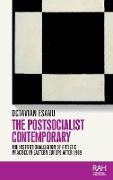- Start
- The Postsocialist Contemporary
The Postsocialist Contemporary
Angebote / Angebote:
The postsocialist contemporary uses a historical perspective of Eastern Europe to intervene in a wider conversation about "contemporary art." It revolves around a concrete case in which a program for contemporary art was assembled on the debris of the Berlin Wall by the Hungarian-American billionaire George Soros.The Soros Centers for Contemporary Art (SCCA) was a network of twenty art centers active during the 1990s in Eastern Europe. The book argues that this program played an important role in the actualization of the paradigm of "contemporary art" in the former bloc. Its main goal, however, is not to recreate the narrative but to use this Soros-funded art infrastructure as a critical point of inquiry for engaging with key forms that occurred in art during the transition to capitalism. The implementation of Western art institutional models by Soros and other players prompted a radical departure in the region: a departure from an art that (officially at least) provided symbolic empowerment to the masses towards one that affirms the interests, needs, desires, and "freedom" of the private individual acting within the boundaries of the bourgeois civil society and the market.The book considers the "postsocialist contemporary" in a broader context of late twentieth-century political, economic, and cultural processes of (neo) liberalization, promoting and encouraging more critical historical materialist examinations of "contemporary art"' - the dominant aesthetic paradigm of late-capitalist market democracy.
Folgt in ca. 10 Arbeitstagen


